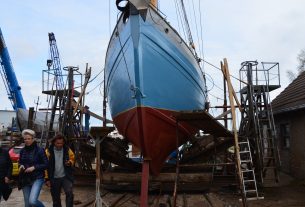LOCATION
The capital and the largest city of the province West Pomeranian, located on the Oder and the Dąbie Lake. The city is just a few kilometers from Mecklenburg-Vorpommern in Germany. Szczecin can be reached by car, public transport by bus or train, as well as by plane (airport – Szczecin Goleniów). The city is located on the West Pomeranian Sailing Route connecting the yacht ports on the Oder River and along the Baltic Sea. You can get there by yacht and stay in a modern marina close to the city center or a hydrofoil from Świnoujście. The Pomeranian Dukes’ Castle is located on an hill near the Odra River and is easily visible at the entrance to the city. 14°34’E 53°26’N


photo source: owns B.Wołowczyk.
SCENIC CHARACTER
Szczecin is the historical capital of the Pomeranian Duchy, and now the capital of the West Pomerania Region. One of the most important monuments on the Griffin Route is the Castle of Pomeranian Dukes’ – the former seat of the rulers of Pomerania, closely related to the history of the city. The seat was expanded over the centuries – from wooden in the Middle Ages, Stone House in the 15th century (its relics have survived to this day), the Gothic-Renaissance castle of Prince Bogusław X (15/16th century) and Renaissance residence from the 16th-century Duke Jan Fryderyk. The present five-wing Renaissance silhouette of the castle with two courtyards dates from the 16th-century from the period of its reconstruction by Duke Philip II – a patron of culture who added a museum wing to the castle. As Philip II had intended, today’s castle is used to practice art – exhibitions, concerts, film screenings and knights’ tournaments take place here. The castle is the seat of cultural institutions, regional authorities and tourist information. In this place, you can learn about the history of the castle by discovering the secrets of its former inhabitants. There are princely sarcophaguses in the crypt. There is also a witch’s cell that tells the story of the famous Sidonia von Borck, who, as the legend goes, cast a curse on the Griffins dynasty, contributing to the extinction of the princely dynasty. It is also necessary to visit the office of Lubinus, the founder of the famous Great Map of the Pomeranian Duchy, in the 17th century. In the courtyard, it is worth paying attention to the clock tower and an erection board Barnim XI from 1538 with the Grand Coat of Arms of the Pomeranian Duchy. After leaving the castle, the obligatory point on the Griffins Route is the National Museum and the exhibition Golden Age of Pomerania depicting the art of the ducal court in the 16th and 17th centuries. The exhibition presents preserved princely clothes, paintings, furnishings from castles and churches of the Griffins, and a vast genealogical tree of this one of the longest-reigning dynasties in Europe. In the nearby cathedral towering above the city, there is the Chapel of Pomeranian Dukes, and above it a stained glass window with the Great Coat of Arms of the Pomeranian Duchy.
ATTRACTIONS
Szczecin is a city of water and greenery: 1/3 of the city are rivers and lakes, 1/3 are large and diverse forest complexes, which is why the city uses the Floating Garden brand. The city centre has a unique urban architecture: a complicated satellite system of squares is connected with beautiful parks and avenues. The proximity of nature allows people to relax and also spend time actively by canoeing or sailing. It is worth going for a stroll along the lovely Chrobry Embankments, or go to a concert to the most modern Philharmonic in Europe. Szczecin is an academic city with a rich cultural offer.
INFORMATION SOURCES
Heritage Class: [ C ]Cultural Heritage
Subclass [MS] : Monuments and sites
WEB PAGES
http://www.szczecin.eu/en/odwiedz_szczecin
http://zamek.szczecin.pl/sladami/sladami/pl/szczecin.html
https://muzeum.szczecin.pl/o-muzeum/siedziby/muzeum-narodowe-w-szczecinie-muzeum-tradycji-regionalnych.html
http://marinas.pl/location/marina-na-wyspie-grodzkiej-1535/#






